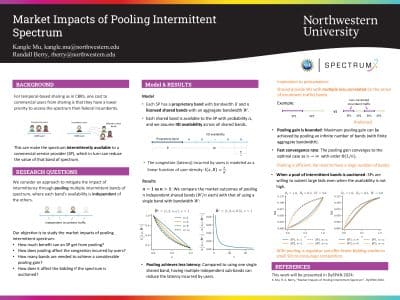Authors
Kangle Mu, Randall Berry
Abstract
Temporal sharing of spectrum as in the CBRS system provides wireless service providers (SPs) with spectrum that is intermittently available. This intermittency can decrease the value of the spectrum to a SP. In this paper we consider a setting where a SP can pool multiple intermittent bands of spectrum with independent availability.
We find that pooling can achieve a higher spectrum efficiency in terms of the congestion incurred by users compared to using a single intermittent band (with the same total bandwidth). We show that this efficiency gain can be achieved with a relatively small pool of bands and it quickly converges to the optimal case as the number of bands increases. We also observe that pooled intermittency has a lesser impact on bids if spectrum is auctioned.

